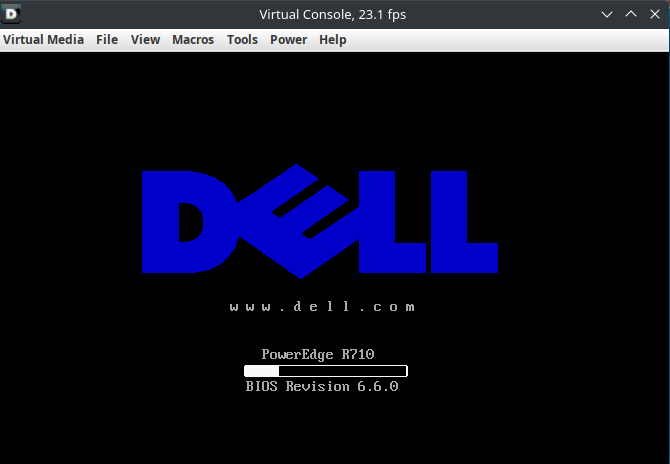Mini Guide: Easy Dell iDRAC access (on Linux)

Dell's IDRAC IPMI/Lights-out/Remote KVM feature is great except for one thing - it uses Java Web Start to deliver the remote control interface - at least on some versions - and this doesn't work so well these days (on Linux at least).
The mini-guide explains how to access it from a computer that struggles, or even refuses to run Java Web Start applications.
In my case, that's Ubuntu 20.04 and onwards (at least).
Motivation
In the last year or so I bought a second-hand Dell R710 from eBay to use as a home server/NAS. It's great value with dual PSUs, plenty of CPU Cores, even more RAM - retrofitted to boot from an SSD and with 4 x 4Tb Western Digital Red drives in a ZFS Pool for storage.
That era of Dell server has a VGA graphics output and an incredibly slow BIOS POST process.
The VGA is very inconvenient - I no longer have any monitors with it.
The slow POST makes reboots feel dicey - who knows if its still booting or if it got stuck for some reason - after all it is fairly dated, refurbished hardware.
So the iDRAC is very useful.
The problem, at least on recent versions of Linux with modern browsers is that when the iDRAC webpage tries to launch the KVM Console it just downloads the Applets jnlp Java Web Start file.
The Solution
After spending a while trying various tactics to run the underlying JAR file I came across idracclient.py.
It's a Python 3 script that downloads and launches the KVM Console client as served from the iDRAC.
It is painfully easy to use (once the dependencies are met - Python 3, JRE 1.8, possibly pip install aiohttp), just:
- Download it
- Make it executable
chmod +x idracclient.py - Optionally, move it to your
PATH(eg:mv idracclient.py /usr/local/bin/) - Run it:
idracclient.py 192.168.12.34passing the IP to the iDRAC

You'll be prompted for the iDRAC (root) login, it'll then download the dependencies needed and launch the Java KVM Console client App.

Troubleshooting
I found in the process of figuring out a good solution I had to update the iDRAC. I tried this without much success using the web interface but found that executing the update over SSH was more reliable.
There are also a few comments on the GitHub gist that may prove helpful.
Script
Below is a copy of the script, for safekeeping:
#!/usr/bin/env python3
"""
Dell iDRAC client launcher for Linux, macOS and Windows.
probably works with Dell iDRAC 6/7/8
Downloads needed Java files and sets up port forwarding via SSH.
example usage: ./idracclient.py -J jumphost.lol.domain srv42-serviceprocessor.lol.domain
for more info, see ./idracclient.py --help
* use python3.6 or later!
* use java 8 (jre 1.8)!
(c) 2018-2019 Jonas Jelten <jelten@in.tum.de>
Released under GNU GPLv3 or any later version
"""
import asyncio
import argparse
import getpass
import pathlib
import socket
import ssl
import subprocess
import sys
import zipfile
import aiohttp
def main():
cmd = argparse.ArgumentParser()
cmd.add_argument("hostname")
cmd.add_argument("--port", "-p", type=int, default=443,
help="https port to connect to for idrac")
cmd.add_argument("--kvmport", "-k", type=int, default=5900,
help="port for the kvm connection")
cmd.add_argument("--basedir", "-b", default="/tmp/idracvm",
help="base directory where to put in state and downloaded stuff")
cmd.add_argument("--java", default="java",
help="custom location for the java executable")
cmd.add_argument("--username", "-u", default="root",
help="idrac login username")
cmd.add_argument("--tlscheck", action="store_true",
help="do certificat validation which is disabled by default")
cmd.add_argument("--force-download", "-f", action="store_true",
help="re-download kvm viewer files and libraries")
cmd.add_argument("--dryrun", action="store_true",
help="don't actually run the viewer, but to everything else")
cmd.add_argument("--jumphost", "-J",
help="use this jumphost for relaying the connection via ssh port forwards")
cmd.add_argument("--jumpkvmport", type=int, default=0,
help="port for kvm listened on localhost by ssh")
cmd.add_argument("--jumphttpport", type=int, default=0,
help="port for idrac webinterface listened on localhost by ssh")
cmd.add_argument("--sshtimeout", type=int, default=8,
help="timeout for establishing the ssh jump host connection")
cmd.add_argument("--no-native-libs", action="store_true",
help="don't download the native libraries for input and device redirecions")
args = cmd.parse_args()
loop = asyncio.get_event_loop()
ret = loop.run_until_complete(run(args))
exit(ret)
async def download(url, check_tls=True):
async with aiohttp.ClientSession() as session:
tls_settings = ssl.create_default_context()
# the crappy iDRACs have slightly outdated crypto...
tls_settings.set_ciphers('ALL:!aNULL:!DH')
if not check_tls:
tls_settings.check_hostname = False
tls_settings.verify_mode = ssl.CERT_NONE
async with session.get(url, ssl=tls_settings) as resp:
return await resp.read()
async def download_all(mainjar, libdir, hostname, port, tlscheck=True, use_native_libs=True):
print("downloading files...")
with mainjar.open("wb") as fd:
content = await download('https://%s:%d/software/avctKVM.jar' % (hostname, port), tlscheck)
fd.write(content)
if use_native_libs:
if sys.platform == 'linux':
libdls = ["avctKVMIOLinux64.jar", "avctVMLinux64.jar"]
extension = ".so"
elif sys.platform == 'darwin':
libdls = ["avctKVMIOMac64.jar", "avctVMMac64.jar"]
extension = ".jnilib"
elif sys.platform == 'win32':
libdls = ["avctKVMIOWin64.jar", "avctVMWin64.jar"]
extension = ".dll"
else:
raise Exception("running on unknown platform: %s" % sys.platform)
for dlname in libdls:
dl_lib = (libdir / dlname)
try:
with dl_lib.open("wb") as fd:
content = await download('https://%s:%d/software/%s' % (hostname, port, dlname), tlscheck)
fd.write(content)
except aiohttp.ClientError:
os.unlink(dl_lib)
raise
zf = zipfile.ZipFile(str(dl_lib))
zf.extractall(str(libdir))
print("finished downloading files.")
async def create_sec_override(path):
# write funny security overwrite file
with path.open("w") as fd:
fd.write("# iDRAC uses disabled, outdated crypto\n")
fd.write("# we override the disabled algos to enable 3DES_EDE_CBC and SSLv3\n")
fd.write("jdk.tls.disabledAlgorithms=RC4, DES, MD5withRSA, DH keySize < 1024, EC keySize < 224\n")
def find_port(blacklist=[]):
port = 9009
sock = socket.socket()
while True:
port += 1
while port in blacklist:
port += 1
try:
sock.bind(('', port))
sock.close()
break
except OSError:
pass
return port
async def run(args):
basedir = pathlib.Path(args.basedir)
hostdir = basedir / args.hostname
libdir = hostdir / "lib"
libdir.mkdir(parents=True, exist_ok=True)
java_kvmhost = args.hostname
java_kvmport = args.kvmport
java_idracport = args.port
# jumphost setup
if args.jumphost:
if args.jumphttpport:
jumpkvmport = args.jumphttpport
else:
jumpkvmport = find_port()
if args.jumphttpport:
jumphttpport = args.jumphttpport
else:
jumphttpport = find_port([jumpkvmport])
print("launching port forwarding...")
forward_invocation = [
"ssh",
"-S", "none",
"-L", "%d:%s:%d" % (jumphttpport, args.hostname, args.port),
"-L", "%d:%s:%d" % (jumpkvmport, args.hostname, args.kvmport),
args.jumphost,
"echo kay && cat",
]
print("$ %s" % " ".join(forward_invocation))
sshproc = await asyncio.create_subprocess_exec(*forward_invocation, stdout=subprocess.PIPE)
# wait until "kay" appears
try:
await asyncio.wait_for(sshproc.stdout.readuntil(b"kay\n"), timeout=args.sshtimeout)
except asyncio.TimeoutError as exc:
raise Exception("failed to set up port forwards via ssh") from exc
print("port forwards established.")
# now java has to connect to localhost
java_kvmhost = "localhost"
java_kvmport = jumpkvmport
java_idracport = jumphttpport
# download java files
mainjar = (hostdir / "avctKVM.jar")
if not (mainjar.is_file() and mainjar.stat().st_size) or args.force_download:
await download_all(mainjar, libdir, java_kvmhost, java_idracport, args.tlscheck, not args.no_native_libs)
else:
print("no need to download files")
# create security override for SSLv3
sec_overwrite_path = (hostdir / "java_security_overrides")
await create_sec_override(sec_overwrite_path)
# query password
if args.dryrun:
password = "xxx-dryrun-xxx"
else:
password = getpass.getpass("enter idrac password: ")
print("launching viewer...")
invocation = [
args.java,
"-cp", str(mainjar),
]
if not args.no_native_libs:
invocation.append("-Djava.library.path=%s" % libdir)
invocation.extend([
# single = means overwrite only parts, == means overwrite all:
"-Djava.security.properties=%s" % sec_overwrite_path,
"com.avocent.idrac.kvm.Main",
"ip=%s" % java_kvmhost,
"kmport=%d" % java_kvmport,
"vport=%d" % java_kvmport,
"user=%s" % args.username,
"passwd=%s" % password,
"apcp=1",
"version=2",
"reconnect=2",
"vmprivilege=true",
"helpurl=https://%s:%d/help/contents.html" % (java_kvmhost, java_idracport),
])
print("$ %s" % " ".join(invocation))
if args.dryrun:
ret = 0
else:
proc = await asyncio.create_subprocess_exec(
*invocation
)
ret = await proc.wait()
if args.jumphost:
sshproc.terminate()
await sshproc.wait()
return ret
if __name__ == "__main__":
main()All credit to Jonas Jelten.
